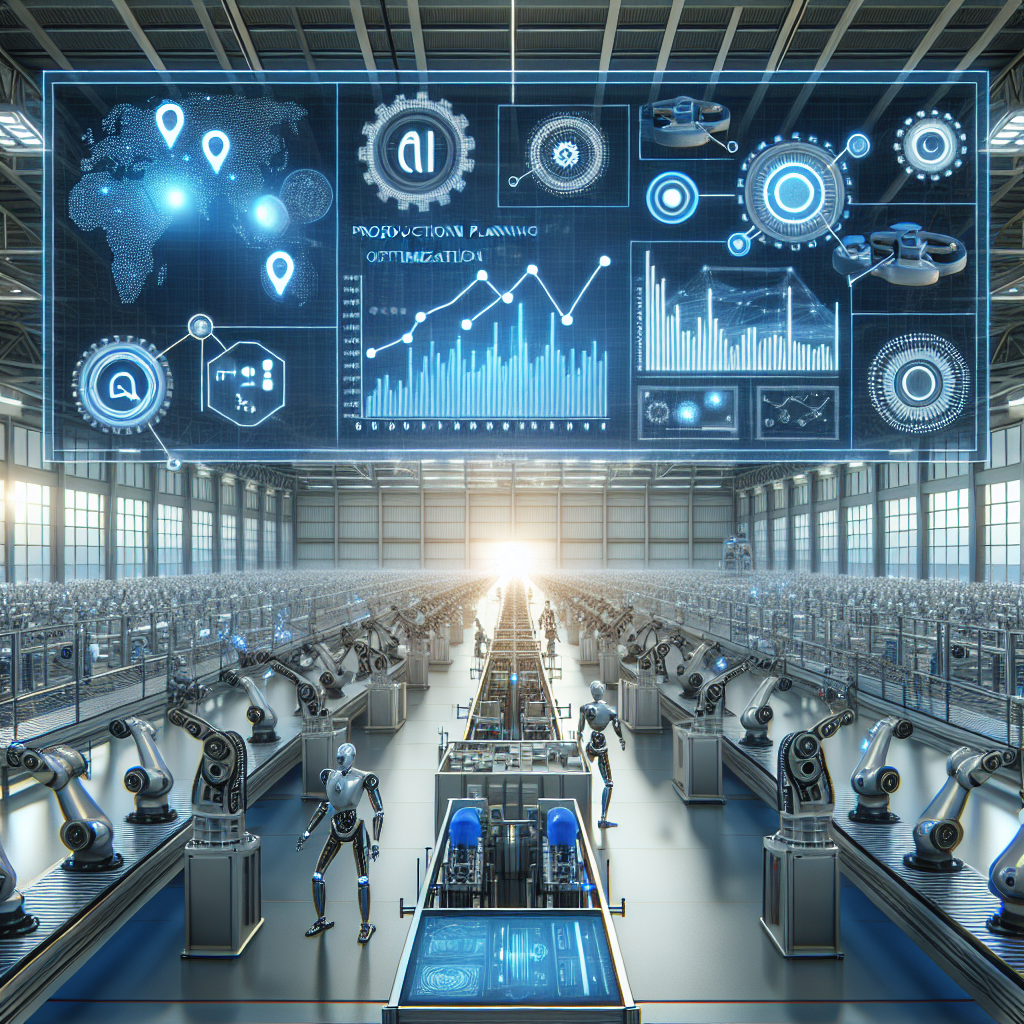In today’s rapidly evolving manufacturing industry, companies are constantly seeking ways to streamline their production processes and increase efficiency. One of the most effective ways to achieve this is through AI-driven production planning optimization. By utilizing artificial intelligence and machine learning algorithms, companies can create more accurate and dynamic production plans that take into account a wide range of variables and constraints.
What is Production Planning Optimization?
Production planning optimization is the process of creating a detailed plan for how a company will produce its products in the most efficient and cost-effective manner possible. This involves determining the optimal sequence of production tasks, scheduling production activities, and allocating resources such as raw materials, equipment, and labor. The goal of production planning optimization is to maximize production output while minimizing costs and meeting customer demand.
Traditionally, production planning has been a time-consuming and labor-intensive process that relies heavily on human expertise and experience. However, with the advent of AI and machine learning technologies, companies can now automate many aspects of the production planning process and generate more accurate and optimized plans in a fraction of the time.
How Does AI-Driven Production Planning Optimization Work?
AI-driven production planning optimization involves the use of sophisticated algorithms that can analyze vast amounts of data and make informed decisions based on that data. These algorithms can take into account a wide range of variables, such as production capacity, lead times, resource availability, and customer demand, to create a production plan that is both efficient and flexible.
One of the key advantages of AI-driven production planning optimization is its ability to adapt to changing circumstances in real-time. For example, if there is a sudden increase in customer demand or a breakdown in a critical piece of equipment, the AI system can quickly reconfigure the production plan to minimize disruptions and maximize output.
In addition, AI-driven production planning optimization can also help companies identify inefficiencies in their production processes and suggest ways to improve them. By analyzing historical production data and identifying patterns and trends, AI algorithms can pinpoint areas where production is bottlenecked or where resources are being underutilized, allowing companies to make strategic adjustments to their production plans.
Benefits of AI-Driven Production Planning Optimization
There are many benefits to implementing AI-driven production planning optimization in manufacturing. Some of the key advantages include:
1. Increased Efficiency: By automating many aspects of the production planning process, companies can create more accurate and optimized production plans in less time, leading to increased efficiency and productivity.
2. Cost Savings: AI-driven production planning optimization can help companies reduce costs by optimizing the allocation of resources, minimizing waste, and identifying inefficiencies in the production process.
3. Improved Flexibility: AI algorithms can quickly adapt to changing circumstances and unexpected events, allowing companies to respond to disruptions in real-time and maintain production continuity.
4. Enhanced Decision-Making: AI-driven production planning optimization provides companies with valuable insights and data-driven recommendations that can help them make more informed decisions and improve overall operational performance.
5. Better Customer Service: By optimizing production plans and improving efficiency, companies can better meet customer demand and deliver products on time, leading to higher customer satisfaction and loyalty.
FAQs about AI-Driven Production Planning Optimization
Q: How does AI-driven production planning optimization differ from traditional production planning methods?
A: Traditional production planning methods rely heavily on manual input and human expertise, which can be time-consuming and prone to errors. AI-driven production planning optimization, on the other hand, uses sophisticated algorithms to analyze data and make informed decisions, leading to more accurate and dynamic production plans.
Q: What types of data are used in AI-driven production planning optimization?
A: AI-driven production planning optimization can analyze a wide range of data, including historical production data, customer demand forecasts, resource availability, and production constraints. By incorporating this data into the optimization process, companies can create more precise and efficient production plans.
Q: How can companies implement AI-driven production planning optimization in their manufacturing processes?
A: Companies can implement AI-driven production planning optimization by partnering with a software provider that specializes in AI and machine learning solutions. These providers can help companies integrate AI algorithms into their existing production planning systems and customize them to meet their specific needs.
Q: What are some challenges associated with implementing AI-driven production planning optimization?
A: One of the main challenges of implementing AI-driven production planning optimization is the need for high-quality and accurate data. Companies must ensure that their data is clean, consistent, and up-to-date in order for the AI algorithms to generate accurate and reliable production plans. Additionally, companies may also face resistance from employees who are hesitant to adopt new technologies and processes.
Q: What are some best practices for implementing AI-driven production planning optimization?
A: Some best practices for implementing AI-driven production planning optimization include:
– Ensuring that the AI algorithms are properly trained and validated on relevant data
– Collaborating with cross-functional teams to ensure buy-in and support for the new technology
– Continuously monitoring and evaluating the performance of the AI algorithms to identify areas for improvement
– Providing training and support to employees to help them understand and effectively use the new technology
In conclusion, AI-driven production planning optimization has the potential to revolutionize the manufacturing industry by creating more efficient, flexible, and cost-effective production plans. By leveraging the power of artificial intelligence and machine learning, companies can streamline their production processes, increase productivity, and improve customer satisfaction. While there are challenges associated with implementing AI-driven production planning optimization, the benefits far outweigh the risks, making it a valuable investment for any manufacturing company looking to stay competitive in today’s fast-paced market.

